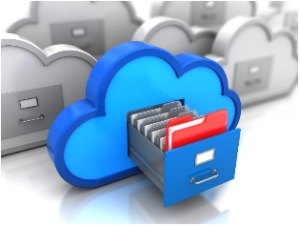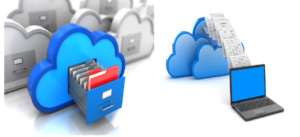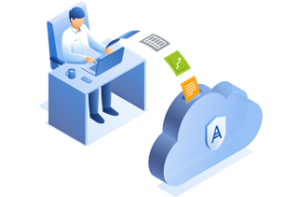Although email archiving is over two decades old, some companies are still reluctant to adopt it. The justification for this is often monetary limitations and limited knowledge on why they really need the email archiving service. This is especially true in small and medium-sized businesses in unregulated industries that often seem like a costly and inessential investment.
Since email archiving is mandated in regulated industries such as healthcare, pharmaceutical, financial services and government, there is a misguided notion that email archiving is only necessary for compliance purposes.
In reality, email archiving benefits go way beyond that.
1. What is Email Archiving?
Before we discuss the benefits, let’s understand what email archiving is.
Email archiving is the process of copying emails from your mailbox to be stored in a separate, secure yet easily accessible location. It allows you to keep a record of everything sent and received, including any attachments.
Emails are copied, indexed, and stored in a tamper-proof format. In essence, archiving gives you a central location to store emails that you no longer need frequent access to. They can still be easily accessed and retrieved as needed in daily operations. You can then search for emails that have been archived by date, contact, or keyword.
Archiving gives you a central location to store email that you no longer need direct access to. This means there’s less chance you’ll delete them. It also ensures your inbox is kept clean and attachments/other files are kept safe.
2. Email Archiving Options
There are typically three ways in which businesses can archive their email. These are:-
- Save absolutely everything.
- Rely on users to archive emails
- Utilize an email archiving solution.
With over 300 billion emails being sent and received every day, storing every single one is not really feasible. Furthermore, with billions of these being spam, storing each one only serves to increase the cost and length of eDiscovery processes.
Studies suggest that three-quarters of an organization’s intellectual property is contained within email systems. This means it’s crucial to protect your email communication as much as possible. Unfortunately, keeping that much information can overload your mail server – this is the origin or premise of email archiving solutions.
Now, if this isn’t enough reason to persuade you to archive your emails, let’s see if we can convince you with more reasons.
3. How Can Your Business Benefit from Email Archiving?
1. Regulatory compliance
Most industries require organizations to keep business records—and since emails often contain such records, deleting them is a no-no. Email is an important corporate record, and so it must be stored correctly.
All businesses must be able to retrieve emails on-demand for investigation, contractual obligations, litigation, or mandatory submission in the course of in-house auditing.
Industries such as financial services, legal, healthcare, pharmaceutical, and government have strict regulations on what records must be kept. Email archiving helps ensure your business remains compliant with data protection requirements which often demand retrieval of data in its original format.
2. Archiving aids with the implementation of retention policies
Additionally, email archiving solutions help you to ensure that your emails are retained in accordance with legal and regulatory requirements.
Creating retention policies is a key measure here. A company’s global retention policy will need to reflect the email retention laws relevant to your industry as well as contain guidelines regarding email deletion.
3. Removes human error or laxity
Even with documented email retention policies and constant policing, it is not prudent to depend on users to archive their own emails as they may either forget or intentionally ignore these guidelines. Manual methods of retention are also prone to user error.
Email archiving is however an automated process and therefore removes the risk of human error and laxity. You don’t have to rely on users adhering to email retention guidelines because email archiving is automatic. All emails are automatically stored, archived, and preserved for you.
4. Email archiving preserves historical data and helps with business continuity
Your employees can easily delete important emails, accidentally or maliciously. Some employees may also delete entire mailboxes upon leaving a company. All these scenarios expose your business to the risk of losing important historical data. An email archiving solution can minimize these risks as it allows for automatic storing and preservation of all emails for a specified duration.
New employees can easily search the archive for useful historical data. This will help them become familiar with client history and in turn, provide better client service.
5. Email archiving improves server performance
With email archiving, you can have settings to delete emails from your primary mail server according to rules-based processes once they have been archived and stored.
By having the most recent emails in the primary server and moving down older emails to the archive, it helps to reduce the time taken to sync and search emails. Moving emails out of the live (primary) server will help to greatly improve the performance of your email server.
6. Improves data storage management and eliminates email quotas
Many businesses falsely believe that storing email on live servers or using built-in archiving features of their email platforms will solve their email accumulation troubles. In reality, one in every four organizations experiences storage management growth of over 20% per year. This growth is largely attributed to email use for business and ever-growing attachment sizes. When organizations impose email quotas, they do so to prevent infinite storage growth and poor server performance.
Setting up automatic email archiving off your primary server eliminates the need to use mailbox quotas as a way to limit the use of a mail server’s storage capacity and prevent server overload. Employees also no longer have to waste precious time deleting emails or moving them to PST files like in the past.
7. Reduced storage requirements
Archiving solutions typically reduce the amount of storage required by using:
- Advanced compression technologies to compress each email and its attachments before archiving. This helps to save 50% or more in overall storage requirements. OR
- De-duplication (also known as single-instance storage). De-duplication ensures that only one copy of each message or attachment is archived. Where a message or attachment is attached repeatedly, only one copy is retained and then referenced.
8. Email archiving eliminates PST files
Individual PST files are prone to data corruption or loss, have a huge impact on storage and can be difficult to search through due to their size and number. With email archiving, you can import all historical .PST files into the solution which you can then search with ease.
9. Simplified backup
Reducing the primary email server’s load allows faster and easier backup.
10. Quick disaster recovery
What happens if you accidentally delete an important email? Losing emails may result in a loss of business-critical data. Even with tech giants like Microsoft 365, there are only limited ways to recover deleted emails, and there is no guarantee for success. If you don’t want to take that gamble, consider a professional email archiving solution.
Email archiving gives you uninterrupted access to your data and allows you to maintain business continuity in case of a disaster.
Many businesses that host their emails in the cloud falsely believe that they do not need dedicated protection for their email. However, this is not the case. Email archiving is still important. Even though third-party/cloud-based email providers host your emails, it is not their responsibility to preserve your data.
11. Accelerates search capabilities
Most archiving solutions provide a basic search and retrieval function for archived data. Some solutions allow users to search by email address, to/from address, attachment name, words within the email, etc. This drastically cuts down the time it takes to find an email.
12. Empowers end-users and improves IT productivity
Locating a single elusive email can turn into a nightmare for your employees, who then reach out to the IT Team for retrieval support. That’s fine, but your IT team already has their hands full.
A fully searchable archive with easy export, restore, download and forward options will save a lot of time and trouble for everyone involved.
Email archiving empowers employees with tools to retrieve their own emails with a single click. They will not have to engage IT to search for them in manual backups (disks or tapes). This, in turn, frees up your IT team from the time-consuming exercise of recovering emails and allows them to focus on more important business matters.
13. Litigation Support (eDiscovery)
We all hope to avoid lawsuits, but in reality, many companies end up being involved in some kind of litigation.
There is a lot of potential evidence contained in emails/attachments. Because email is an important corporate record, you may need to provide email records if your company is ever involved in a lawsuit. Unfortunately, many organizations only fully understand the benefits of email archiving when faced with a court case.
Retrieving email data from live servers is time-consuming. To locate all emails relevant to the case, IT teams need to browse entire email histories. They then need to place a legal hold on those emails to prevent any deliberate deletion, alteration and destruction of evidence. Finally, they need to review everything and export it to an accepted format.
Email archiving provides the support necessary in the event of a legal proceeding as it supports eDiscovery. eDiscovery is the process of finding, locating, securing, and searching archive data with the intent of using it in a civil or criminal legal case. An email archiving solution allows organizations to search and filter emails and apply litigation holds without relying on external legal teams for data retrieval. Without email archives, the cost of retrieving data for litigation can be as financially damaging as the litigation itself.
14. Email archives are typically tamper-proof
While users can search and retrieve emails from the archive, most solutions are tamper-proof – an essential feature for compliance.
Since email can be used as evidence, it’s vital that your organization can prove that the emails have been archived in their original state and remained intact while in the archive. It is not possible to alter or delete emails in the archive (yes, not even by the IT department).
Additionally, some solutions also have tamper-proof logging. The archive logs show who reads what in the archive and when they read it.
Some email archiving solutions will digitally sign emails to allow them to be admissible as evidence in a court of law.
15. Reduces the cost of storage, maintenance, and litigation
Last but not least, the majority of organizations will see their data grow every year, which equates to increased storage and storage management costs. Most email server systems demand fast, expensive technologies and disks. However, email archiving solutions can work effectively on cheap storage.
Using third-party email archiving services also reduces costs associated with the maintenance of IT infrastructure. In this case, the service provider will be responsible for maintaining the infrastructure that stores your emails. This allows you to use cost savings for other important business initiatives.
Email archiving is sometimes considered an unnecessary cost. However, it only takes one litigation case to understand the true value of an email archive.
4. Summary
Email archiving is critical for your business, and not just so you can comply with regulations. A huge amount of business-critical information may exist solely in email so it’s vital that you don’t lose this.
MailSafi is a leader in corporate email solutions with 10+ years of experience. Get in touch with us to learn more about our email archiving solution.
![]()





Pingback: Choosing the Right Email Service Provider: 12 Factors to Consider » The MailSafi Blog
Pingback: How to Choose the Best Email Security Solution for Your Business » The MailSafi Blog
Pingback: 7 benefits of Cloud Email Hosting for your Business